Unit 10 You're supposed to shake hands.Section B 2a—Self Check 课件 (共32张PPT)人教版九年级全册
文档属性
| 名称 | Unit 10 You're supposed to shake hands.Section B 2a—Self Check 课件 (共32张PPT)人教版九年级全册 |  | |
| 格式 | pptx | ||
| 文件大小 | 2.6MB | ||
| 资源类型 | 教案 | ||
| 版本资源 | 人教新目标(Go for it)版 | ||
| 科目 | 英语 | ||
| 更新时间 | 2025-01-05 17:32:15 | ||
图片预览

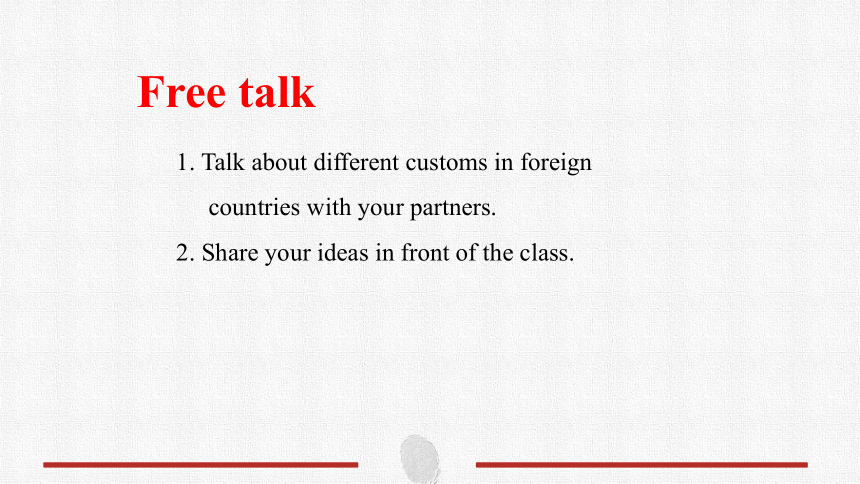
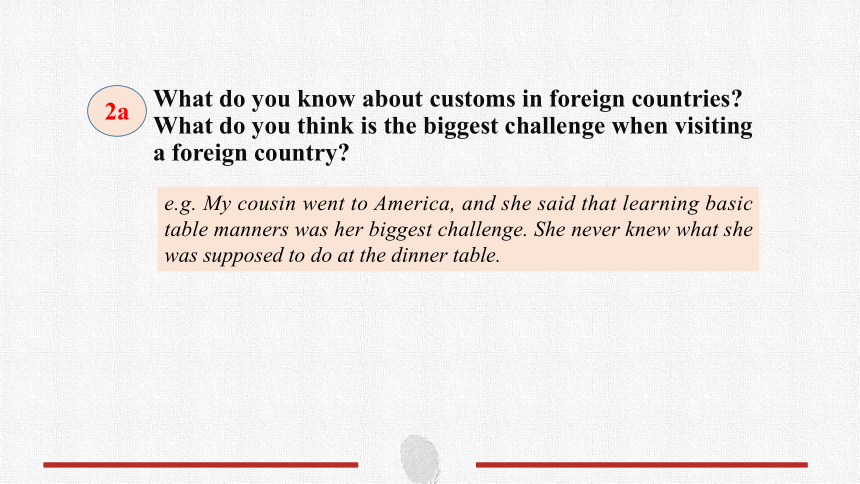
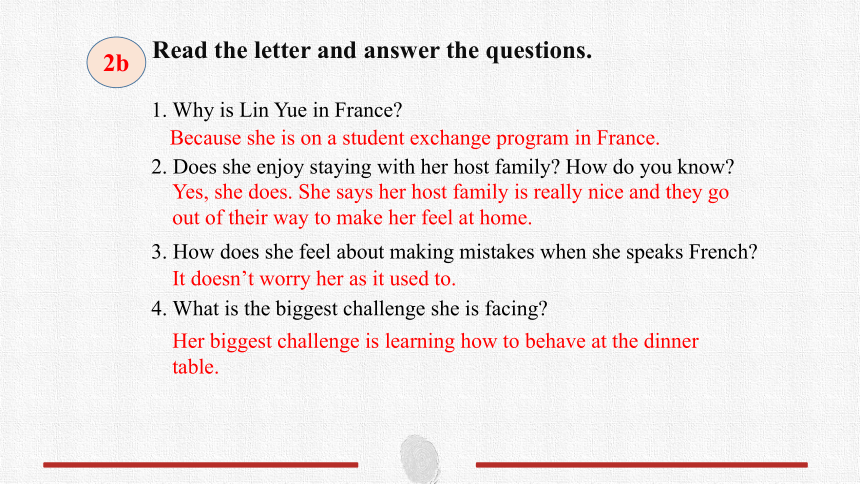
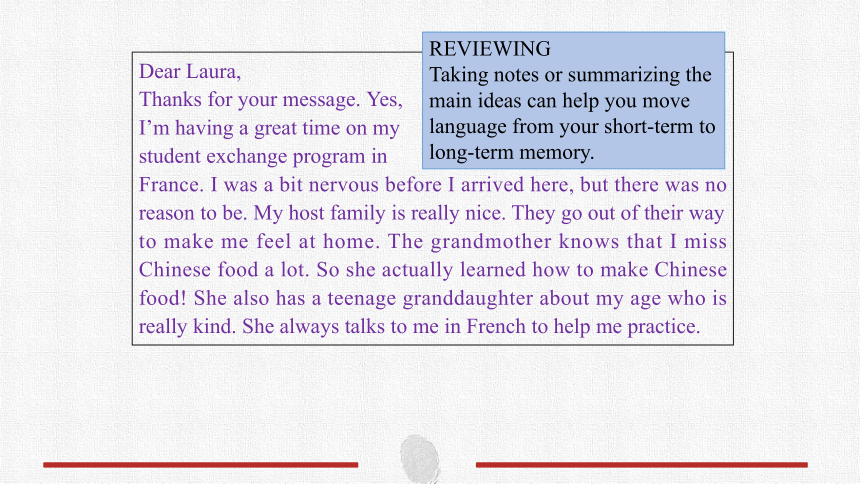
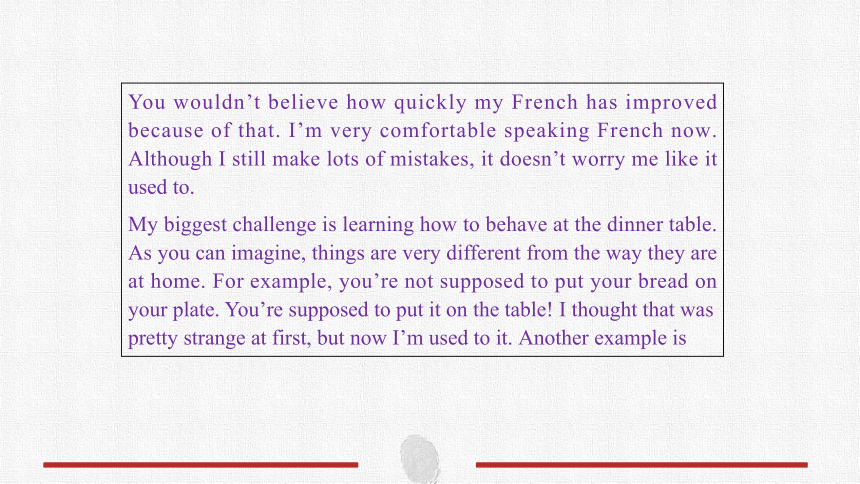
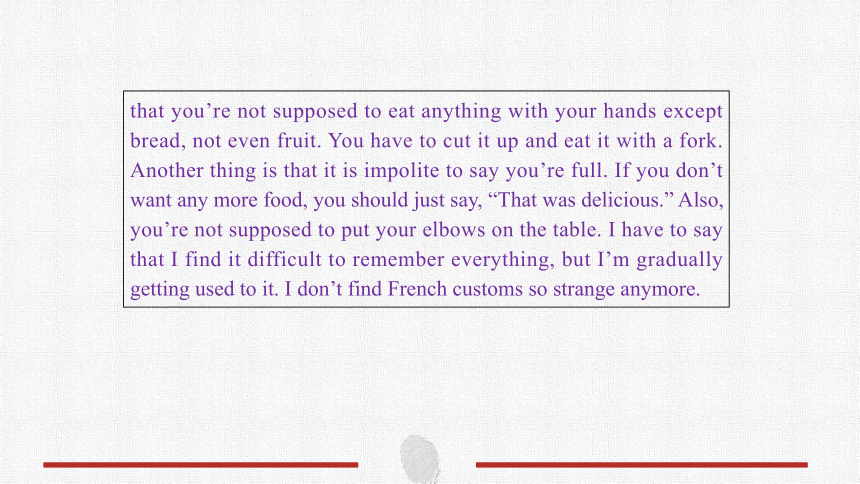
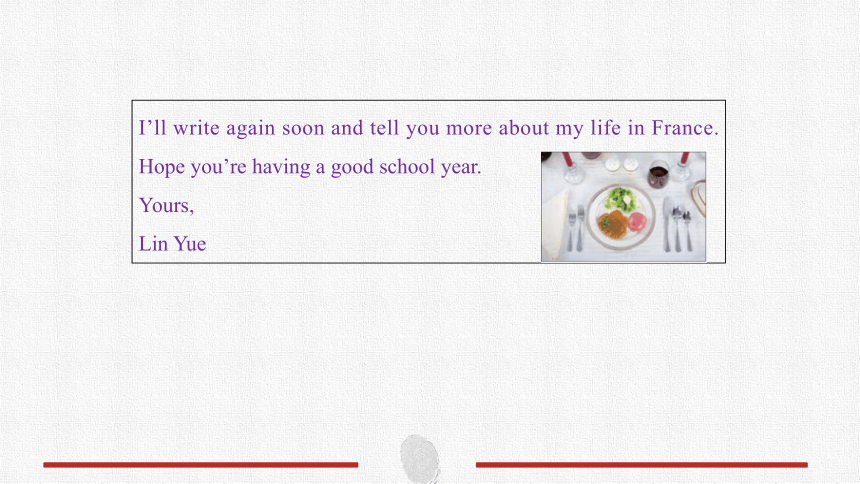
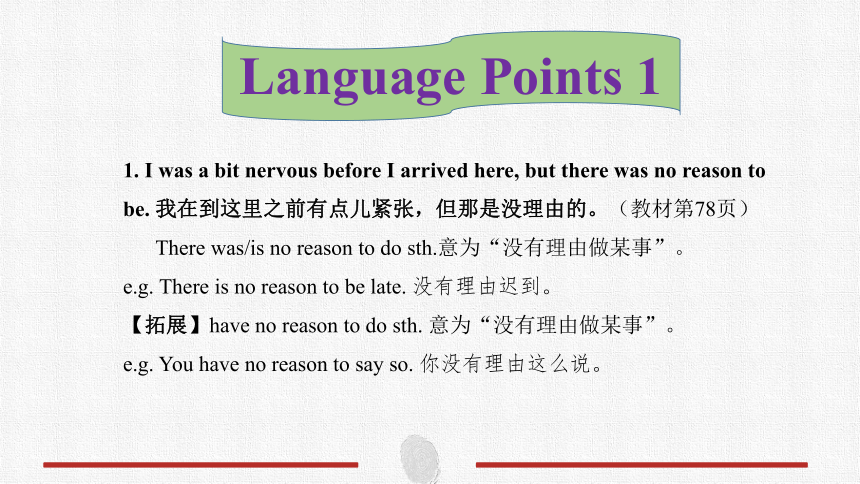
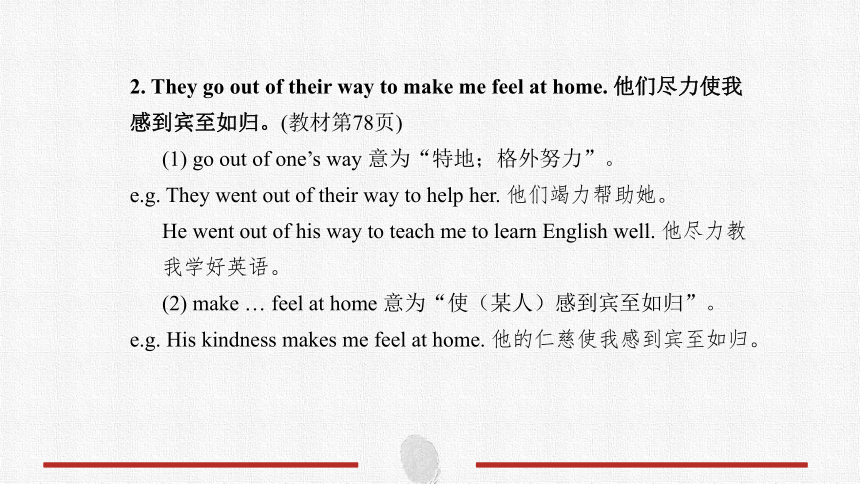

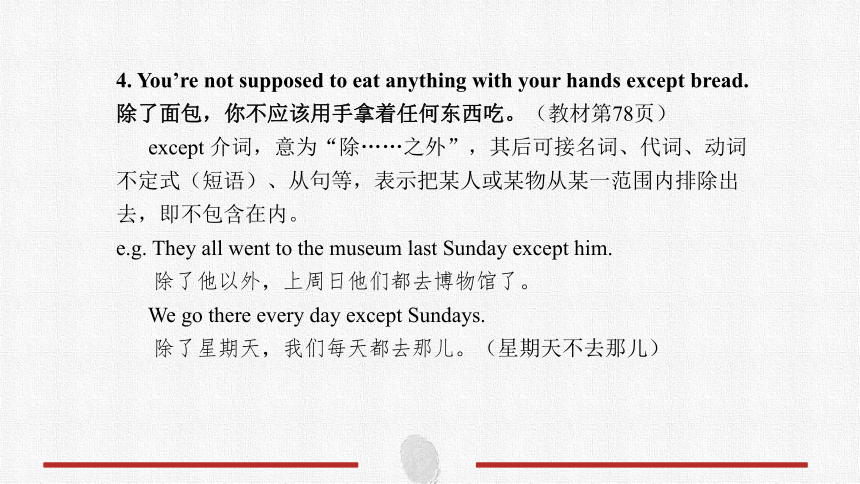
文档简介
(共32张PPT)
Unit 10 You’re supposed to shake hands.
The Fifth Period
Section B(2a—Self Check )
Free talk
1. Talk about different customs in foreign
countries with your partners.
2. Share your ideas in front of the class.
e.g. My cousin went to America, and she said that learning basic table manners was her biggest challenge. She never knew what she was supposed to do at the dinner table.
What do you know about customs in foreign countries What do you think is the biggest challenge when visiting a foreign country
2a
Read the letter and answer the questions.
2b
1. Why is Lin Yue in France
2. Does she enjoy staying with her host family How do you know
3. How does she feel about making mistakes when she speaks French
4. What is the biggest challenge she is facing
Because she is on a student exchange program in France.
Yes, she does. She says her host family is really nice and they go out of their way to make her feel at home.
It doesn’t worry her as it used to.
Her biggest challenge is learning how to behave at the dinner table.
Dear Laura,
Thanks for your message. Yes,
I’m having a great time on my
student exchange program in
France. I was a bit nervous before I arrived here, but there was no reason to be. My host family is really nice. They go out of their way to make me feel at home. The grandmother knows that I miss Chinese food a lot. So she actually learned how to make Chinese food! She also has a teenage granddaughter about my age who is really kind. She always talks to me in French to help me practice.
REVIEWING
Taking notes or summarizing the main ideas can help you move language from your short-term to long-term memory.
You wouldn’t believe how quickly my French has improved because of that. I’m very comfortable speaking French now. Although I still make lots of mistakes, it doesn’t worry me like it used to.
My biggest challenge is learning how to behave at the dinner table. As you can imagine, things are very different from the way they are at home. For example, you’re not supposed to put your bread on your plate. You’re supposed to put it on the table! I thought that was pretty strange at first, but now I’m used to it. Another example is
that you’re not supposed to eat anything with your hands except bread, not even fruit. You have to cut it up and eat it with a fork. Another thing is that it is impolite to say you’re full. If you don’t want any more food, you should just say, “That was delicious.” Also, you’re not supposed to put your elbows on the table. I have to say that I find it difficult to remember everything, but I’m gradually getting used to it. I don’t find French customs so strange anymore.
I’ll write again soon and tell you more about my life in France. Hope you’re having a good school year.
Yours,
Lin Yue
1. I was a bit nervous before I arrived here, but there was no reason to be. 我在到这里之前有点儿紧张,但那是没理由的。(教材第78页)
There was/is no reason to do sth.意为“没有理由做某事”。
e.g. There is no reason to be late. 没有理由迟到。
【拓展】have no reason to do sth. 意为“没有理由做某事”。
e.g. You have no reason to say so. 你没有理由这么说。
Language Points 1
2. They go out of their way to make me feel at home. 他们尽力使我感到宾至如归。(教材第78页)
(1) go out of one’s way 意为“特地;格外努力”。
e.g. They went out of their way to help her. 他们竭力帮助她。
He went out of his way to teach me to learn English well. 他尽力教
我学好英语。
(2) make … feel at home 意为“使(某人)感到宾至如归”。
e.g. His kindness makes me feel at home. 他的仁慈使我感到宾至如归。
3. So she actually learned how to make Chinese food! 所以她竟然学习如何做中餐!(教材第 78 页)
how to make Chinese food 为“疑问词+动词不定式”结构,在句中作 learned 的宾语。
e.g. I want to learn how to make dumplings. 我想学习如何包饺子。
4. You’re not supposed to eat anything with your hands except bread. 除了面包,你不应该用手拿着任何东西吃。(教材第78页)
except 介词,意为“除……之外”,其后可接名词、代词、动词不定式(短语)、从句等,表示把某人或某物从某一范围内排除出去,即不包含在内。
e.g. They all went to the museum last Sunday except him.
除了他以外,上周日他们都去博物馆了。
We go there every day except Sundays.
除了星期天,我们每天都去那儿。(星期天不去那儿)
5. I have to say that I find it difficult to remember everything. 我不得
不说我发现记住每件事情很难。(教材第78页)
find it + adj. + to do sth. 意为“发现做某事是……的”。find 后接复合宾语,其中 it 在此处作形式宾语,真正的宾语是后面的动词不定式 to do sth.,形容词在句中作宾语补足语。
e.g. I find it very interesting to learn English.
我发现学英语很有趣。
I found it hard to finish the work alone.
我发现独自完成那项工作很难。
6. I’m gradually getting used to it. 我逐渐习惯它了。(教材第78页)
get used to 相当于 be used to,意为“习惯于……”,其中 to 为介词,其后可接名词、代词或动词 -ing 形式。
e.g. She gets/is used to getting up early. 她习惯于早起。
【拓展】辨析 get/be used to (doing) sth.,used to do sth.与 be used to do sth.
get/be used to (doing) sth. 习惯于(做)某事 to 为介词,其后可接名词、代词或动词 -ing形式,可用于现在、过去、将来等多种时态
used to do sth. 过去常常做某事 to 为动词不定式符号,只用于过去时态
be used to do sth. 被用于做某事 是被动语态,动词不定式表示目的,可用于多种时态
e.g. He gets/is used to going to bed late. 他习惯于晚睡。
He used to read a book before he went to bed, but now he is used to listening
to music. 他过去常常上床睡觉前看书,但现在他习惯于听音乐。
Wood is used to build houses. 木头被用来建房子。
1. Making mistakes in French used to
make Lin Yue nervous.
2. It was quite hard for her to feel good
about speaking French.
3. The host family tried very hard to
help Lin Yue.
4. Lin Yue has slowly learned how to
be like her French friends.
went out of their way
be comfortable (doing)
gradually gotten used to being
(something) worry (someone)
Read the sentences and replace the underlined words with the phrases in the box.
2c
Dos Don’ts
You’re expected to put your bread on the table. You’re not supposed to put your bread on your plate.
You’re expected to cut up your fruit and eat it with a fork.
You’re expected to say “That was delicious” if you don’t want any more food.
You’re not supposed to eat anything with your hands except bread.
You’re not supposed to say you’re full.
You’re not supposed to put your elbows on the table.
Review the passage and make notes about French customs in the chart.
2d
e.g. In France, people put their bread on the table.But in
China, we always put our food on a plate or in a bowl.
We never put food on the table.
Compare the table manners in France and China in your group. How are they the same or different Make a list.
2e
Your pen pal is coming to China on an exchange program. He/She is asking you about Chinese customs and what he/she is supposed to do or not. Make notes in the chart.
3a
Table manners It’s polite/impolite to …
House rules You’re supposed/not supposed to …
Going out with people You should …
Table manners
House rules
Going out with people
It’s polite to ask older people to start eating first at the table.
It’s impolite to pick up your bowl to eat.
You’re supposed to use chopsticks to eat.
It’s impolite to stick your chopsticks into your food.
It’s impolite to point at anyone with your chopsticks.
It’s impolite to knock your empty bowl with your chopsticks.
…
You’re supposed to greet the host family.
You’re supposed to shake hands with people.
You’re supposed to say “ni hao” to people.
You’re not supposed to bow, kiss or hug with people.
…
You should call first.
You should make a going-out plan with friends.
Dear _____________,
You must be excited about coming to China soon. Let me give you some suggestions and advice about Chinese customs. When you’re eating at the table, it’s impolite to __________________________
______________________________________________________
In our house, you’re supposed to ___________________________
______________________________________________________
When you go out with people, you should ____________________
______________________________________________________
Have a safe trip, and I look forward to meeting you soon!
Best wishes,
__________
Write a letter to your pen pal to give him/her advice and suggestions on how to behave properly in China.
3b
思路点拨:
1.体裁:应用文
2.人称:第一人称、第二人称
3.时态:一般现在时
写作步骤:
第一步:审题,找出文章要表达的中心;
第二步:用简单的句子或短语列出文章要点;
第三步:运用本单元所学知识将句子补充完整;
第四步:运用恰当的连词将句子和段落紧密地衔接起来。
开篇点题 Let me give you some suggestions and advice about Chinese customs.
介绍中国的礼仪 When you’re eating at the table …
In our house …
When you go out with people …
美好祝愿 Have a safe trip, and I look forward to meeting you soon!
参考范文:
Dear …,
You must be excited about coming to China soon.Let me give you some suggestions and advice about Chinese customs.When you’re eating at the table,it’s impolite to stick your chopsticks into your food.You are not supposed to point at anyone with your chopsticks.In our house,you’re supposed to shake hands with my father for the first time.You are not supposed to kiss when you meet my mother.You can say “hello” to her with a smile.When you go out with people,you should call first.It’s important to make plans to do something interesting or go somewhere together.
Have a safe trip,and I look forward to meeting you soon!
Best wishes,
…
1 Fill in the blanks with the words in the box.
1. In many countries, it is impolite to show up at someone’s house for
the first time with _______ hands. You should always bring a small
gift.
2. Billy was very uncomfortable at a fine-dining restaurant last night
because he didn’t know _______ table manners.
3. It is _______ spending the time to learn about the customs of a
country before you go there. That way, you will know what you are
supposed to do in different situations.
4. The _______ is always the worst in the ________ city. It is
important to leave earlier if you are traveling by car.
5. Sandy went into her sister’s room without ________ on the door.
That made her sister _____.
worth
capital
basic
traffic
empty
mad
knocking
empty
basic
worth
traffic
capital
knocking
mad
Self Check
2 Think about your culture and make statements.
In my culture, when you …
you’re supposed to _______________________________________.
you’re not supposed to ____________________________________.
you’re expected to ________________________________________.
it’s impolite to ____________________________________.
it’s important to _________________________________________.
allow the elderly to start eating first
stick your chopsticks into a bowl of rice
keep your mouth closed when you are chewing
reach across the table to pick certain foods
ask for permission to leave the table early
1. Let me give you some suggestions and advice about Chinese customs. 让我给你一些关于中国风俗的建议和意见。(教材第80页)
(1) let sb. do sth. 意为“让某人做某事”。
e.g. Let me help them. 让我帮他们吧。
(2) give sb. some suggestions and advice 意为“给某人一些建议和意见。”
e.g. The teacher gave me some suggestions and advice about how to learn
English well. 老师在如何学好英语方面给了我一些建议和意见。
Language Points 2
(3) suggestion 此处用作可数名词,意为“建议”。其动词形式是suggest,意为“建议”。
e.g. I have a suggestion to make. 我有个建议要提。
I went there at/on your suggestion. 我是根据你的建议到那里去的。
(4) advice 不可数名词,意为“建议;意见”。表示“一条建议”应用 a piece of advice,而不能说 an advice。其常用短语还有:
ask for sb.’s advice 向某人征求建议;
give sb. some advice on …在……方面给某人一些劝告;accept/follow/take sb.’s advice 接受某人的建议。
2. In many countries, it is impolite to show up at someone’s house for the first time with empty hands. 在许多国家,第一次拜访别人家空着手是不礼貌的。(教材第80页)
show up 意为“出席;露面”,相当于 appear。
e.g. We waited for him for a long time, but he didn’t show up. 我们等了他很长时间,但他没有露面。
【拓展】有关 show 的常见短语:
show off 炫耀,卖弄
show sb. around 带领某人参观
on show 展出;展览
一、用所给单词的适当形式填空
1. Teenagers are supposed _________ (be) brave enough to ask
questions.
2. The little boy got used to __________(go) to school by bike.
3. As long as you keep on using the method, you will _________
(gradual) improve your English.
to be
going
Exercise
gradually
二、语篇填空之基础训练
1. Jim is polite and he usually __________ at the door before going into
anybody’s room.
2. Tom, stop ________ the bowl at table. It’s really impolite.
3. We are open to ____________ that are good for us.
4. My hometown ____________ greatly since 10 years ago.
5. After the stamp ___________ to the envelope, she sent out the letter.
stick hit change knock suggest
knocks
hitting
suggestions
has changed
was stuck
1. Recite the important phrases.
2. Write an article about customs.
Homework
Unit 10 You’re supposed to shake hands.
The Fifth Period
Section B(2a—Self Check )
Free talk
1. Talk about different customs in foreign
countries with your partners.
2. Share your ideas in front of the class.
e.g. My cousin went to America, and she said that learning basic table manners was her biggest challenge. She never knew what she was supposed to do at the dinner table.
What do you know about customs in foreign countries What do you think is the biggest challenge when visiting a foreign country
2a
Read the letter and answer the questions.
2b
1. Why is Lin Yue in France
2. Does she enjoy staying with her host family How do you know
3. How does she feel about making mistakes when she speaks French
4. What is the biggest challenge she is facing
Because she is on a student exchange program in France.
Yes, she does. She says her host family is really nice and they go out of their way to make her feel at home.
It doesn’t worry her as it used to.
Her biggest challenge is learning how to behave at the dinner table.
Dear Laura,
Thanks for your message. Yes,
I’m having a great time on my
student exchange program in
France. I was a bit nervous before I arrived here, but there was no reason to be. My host family is really nice. They go out of their way to make me feel at home. The grandmother knows that I miss Chinese food a lot. So she actually learned how to make Chinese food! She also has a teenage granddaughter about my age who is really kind. She always talks to me in French to help me practice.
REVIEWING
Taking notes or summarizing the main ideas can help you move language from your short-term to long-term memory.
You wouldn’t believe how quickly my French has improved because of that. I’m very comfortable speaking French now. Although I still make lots of mistakes, it doesn’t worry me like it used to.
My biggest challenge is learning how to behave at the dinner table. As you can imagine, things are very different from the way they are at home. For example, you’re not supposed to put your bread on your plate. You’re supposed to put it on the table! I thought that was pretty strange at first, but now I’m used to it. Another example is
that you’re not supposed to eat anything with your hands except bread, not even fruit. You have to cut it up and eat it with a fork. Another thing is that it is impolite to say you’re full. If you don’t want any more food, you should just say, “That was delicious.” Also, you’re not supposed to put your elbows on the table. I have to say that I find it difficult to remember everything, but I’m gradually getting used to it. I don’t find French customs so strange anymore.
I’ll write again soon and tell you more about my life in France. Hope you’re having a good school year.
Yours,
Lin Yue
1. I was a bit nervous before I arrived here, but there was no reason to be. 我在到这里之前有点儿紧张,但那是没理由的。(教材第78页)
There was/is no reason to do sth.意为“没有理由做某事”。
e.g. There is no reason to be late. 没有理由迟到。
【拓展】have no reason to do sth. 意为“没有理由做某事”。
e.g. You have no reason to say so. 你没有理由这么说。
Language Points 1
2. They go out of their way to make me feel at home. 他们尽力使我感到宾至如归。(教材第78页)
(1) go out of one’s way 意为“特地;格外努力”。
e.g. They went out of their way to help her. 他们竭力帮助她。
He went out of his way to teach me to learn English well. 他尽力教
我学好英语。
(2) make … feel at home 意为“使(某人)感到宾至如归”。
e.g. His kindness makes me feel at home. 他的仁慈使我感到宾至如归。
3. So she actually learned how to make Chinese food! 所以她竟然学习如何做中餐!(教材第 78 页)
how to make Chinese food 为“疑问词+动词不定式”结构,在句中作 learned 的宾语。
e.g. I want to learn how to make dumplings. 我想学习如何包饺子。
4. You’re not supposed to eat anything with your hands except bread. 除了面包,你不应该用手拿着任何东西吃。(教材第78页)
except 介词,意为“除……之外”,其后可接名词、代词、动词不定式(短语)、从句等,表示把某人或某物从某一范围内排除出去,即不包含在内。
e.g. They all went to the museum last Sunday except him.
除了他以外,上周日他们都去博物馆了。
We go there every day except Sundays.
除了星期天,我们每天都去那儿。(星期天不去那儿)
5. I have to say that I find it difficult to remember everything. 我不得
不说我发现记住每件事情很难。(教材第78页)
find it + adj. + to do sth. 意为“发现做某事是……的”。find 后接复合宾语,其中 it 在此处作形式宾语,真正的宾语是后面的动词不定式 to do sth.,形容词在句中作宾语补足语。
e.g. I find it very interesting to learn English.
我发现学英语很有趣。
I found it hard to finish the work alone.
我发现独自完成那项工作很难。
6. I’m gradually getting used to it. 我逐渐习惯它了。(教材第78页)
get used to 相当于 be used to,意为“习惯于……”,其中 to 为介词,其后可接名词、代词或动词 -ing 形式。
e.g. She gets/is used to getting up early. 她习惯于早起。
【拓展】辨析 get/be used to (doing) sth.,used to do sth.与 be used to do sth.
get/be used to (doing) sth. 习惯于(做)某事 to 为介词,其后可接名词、代词或动词 -ing形式,可用于现在、过去、将来等多种时态
used to do sth. 过去常常做某事 to 为动词不定式符号,只用于过去时态
be used to do sth. 被用于做某事 是被动语态,动词不定式表示目的,可用于多种时态
e.g. He gets/is used to going to bed late. 他习惯于晚睡。
He used to read a book before he went to bed, but now he is used to listening
to music. 他过去常常上床睡觉前看书,但现在他习惯于听音乐。
Wood is used to build houses. 木头被用来建房子。
1. Making mistakes in French used to
make Lin Yue nervous.
2. It was quite hard for her to feel good
about speaking French.
3. The host family tried very hard to
help Lin Yue.
4. Lin Yue has slowly learned how to
be like her French friends.
went out of their way
be comfortable (doing)
gradually gotten used to being
(something) worry (someone)
Read the sentences and replace the underlined words with the phrases in the box.
2c
Dos Don’ts
You’re expected to put your bread on the table. You’re not supposed to put your bread on your plate.
You’re expected to cut up your fruit and eat it with a fork.
You’re expected to say “That was delicious” if you don’t want any more food.
You’re not supposed to eat anything with your hands except bread.
You’re not supposed to say you’re full.
You’re not supposed to put your elbows on the table.
Review the passage and make notes about French customs in the chart.
2d
e.g. In France, people put their bread on the table.But in
China, we always put our food on a plate or in a bowl.
We never put food on the table.
Compare the table manners in France and China in your group. How are they the same or different Make a list.
2e
Your pen pal is coming to China on an exchange program. He/She is asking you about Chinese customs and what he/she is supposed to do or not. Make notes in the chart.
3a
Table manners It’s polite/impolite to …
House rules You’re supposed/not supposed to …
Going out with people You should …
Table manners
House rules
Going out with people
It’s polite to ask older people to start eating first at the table.
It’s impolite to pick up your bowl to eat.
You’re supposed to use chopsticks to eat.
It’s impolite to stick your chopsticks into your food.
It’s impolite to point at anyone with your chopsticks.
It’s impolite to knock your empty bowl with your chopsticks.
…
You’re supposed to greet the host family.
You’re supposed to shake hands with people.
You’re supposed to say “ni hao” to people.
You’re not supposed to bow, kiss or hug with people.
…
You should call first.
You should make a going-out plan with friends.
Dear _____________,
You must be excited about coming to China soon. Let me give you some suggestions and advice about Chinese customs. When you’re eating at the table, it’s impolite to __________________________
______________________________________________________
In our house, you’re supposed to ___________________________
______________________________________________________
When you go out with people, you should ____________________
______________________________________________________
Have a safe trip, and I look forward to meeting you soon!
Best wishes,
__________
Write a letter to your pen pal to give him/her advice and suggestions on how to behave properly in China.
3b
思路点拨:
1.体裁:应用文
2.人称:第一人称、第二人称
3.时态:一般现在时
写作步骤:
第一步:审题,找出文章要表达的中心;
第二步:用简单的句子或短语列出文章要点;
第三步:运用本单元所学知识将句子补充完整;
第四步:运用恰当的连词将句子和段落紧密地衔接起来。
开篇点题 Let me give you some suggestions and advice about Chinese customs.
介绍中国的礼仪 When you’re eating at the table …
In our house …
When you go out with people …
美好祝愿 Have a safe trip, and I look forward to meeting you soon!
参考范文:
Dear …,
You must be excited about coming to China soon.Let me give you some suggestions and advice about Chinese customs.When you’re eating at the table,it’s impolite to stick your chopsticks into your food.You are not supposed to point at anyone with your chopsticks.In our house,you’re supposed to shake hands with my father for the first time.You are not supposed to kiss when you meet my mother.You can say “hello” to her with a smile.When you go out with people,you should call first.It’s important to make plans to do something interesting or go somewhere together.
Have a safe trip,and I look forward to meeting you soon!
Best wishes,
…
1 Fill in the blanks with the words in the box.
1. In many countries, it is impolite to show up at someone’s house for
the first time with _______ hands. You should always bring a small
gift.
2. Billy was very uncomfortable at a fine-dining restaurant last night
because he didn’t know _______ table manners.
3. It is _______ spending the time to learn about the customs of a
country before you go there. That way, you will know what you are
supposed to do in different situations.
4. The _______ is always the worst in the ________ city. It is
important to leave earlier if you are traveling by car.
5. Sandy went into her sister’s room without ________ on the door.
That made her sister _____.
worth
capital
basic
traffic
empty
mad
knocking
empty
basic
worth
traffic
capital
knocking
mad
Self Check
2 Think about your culture and make statements.
In my culture, when you …
you’re supposed to _______________________________________.
you’re not supposed to ____________________________________.
you’re expected to ________________________________________.
it’s impolite to ____________________________________.
it’s important to _________________________________________.
allow the elderly to start eating first
stick your chopsticks into a bowl of rice
keep your mouth closed when you are chewing
reach across the table to pick certain foods
ask for permission to leave the table early
1. Let me give you some suggestions and advice about Chinese customs. 让我给你一些关于中国风俗的建议和意见。(教材第80页)
(1) let sb. do sth. 意为“让某人做某事”。
e.g. Let me help them. 让我帮他们吧。
(2) give sb. some suggestions and advice 意为“给某人一些建议和意见。”
e.g. The teacher gave me some suggestions and advice about how to learn
English well. 老师在如何学好英语方面给了我一些建议和意见。
Language Points 2
(3) suggestion 此处用作可数名词,意为“建议”。其动词形式是suggest,意为“建议”。
e.g. I have a suggestion to make. 我有个建议要提。
I went there at/on your suggestion. 我是根据你的建议到那里去的。
(4) advice 不可数名词,意为“建议;意见”。表示“一条建议”应用 a piece of advice,而不能说 an advice。其常用短语还有:
ask for sb.’s advice 向某人征求建议;
give sb. some advice on …在……方面给某人一些劝告;accept/follow/take sb.’s advice 接受某人的建议。
2. In many countries, it is impolite to show up at someone’s house for the first time with empty hands. 在许多国家,第一次拜访别人家空着手是不礼貌的。(教材第80页)
show up 意为“出席;露面”,相当于 appear。
e.g. We waited for him for a long time, but he didn’t show up. 我们等了他很长时间,但他没有露面。
【拓展】有关 show 的常见短语:
show off 炫耀,卖弄
show sb. around 带领某人参观
on show 展出;展览
一、用所给单词的适当形式填空
1. Teenagers are supposed _________ (be) brave enough to ask
questions.
2. The little boy got used to __________(go) to school by bike.
3. As long as you keep on using the method, you will _________
(gradual) improve your English.
to be
going
Exercise
gradually
二、语篇填空之基础训练
1. Jim is polite and he usually __________ at the door before going into
anybody’s room.
2. Tom, stop ________ the bowl at table. It’s really impolite.
3. We are open to ____________ that are good for us.
4. My hometown ____________ greatly since 10 years ago.
5. After the stamp ___________ to the envelope, she sent out the letter.
stick hit change knock suggest
knocks
hitting
suggestions
has changed
was stuck
1. Recite the important phrases.
2. Write an article about customs.
Homework
同课章节目录
- Unit 1 How can we become good learners.
- Section A
- Section B
- Unit 2 I think that mooncakes are delicious!
- Section A
- Section B
- Unit 3 Could you please tell me where the restroom
- Section A
- Section B
- Unit 4 I used to be afraid of the dark.
- Section A
- Section B
- Unit 5 What are the shirts made of?
- Section A
- Section B
- Review of Units 1-5
- Unit 6 When was it invented?
- Section A
- Section B
- Unit 7 Teenagers should be allowed to choose their
- Section A
- Section B
- Unit 8 It must belong to Carla.
- Section A
- Section B
- Unit 9 I like music that I can dance to.
- Section A
- Section B
- Unit 10 You're supposed to shake hands.
- Section A
- Section B
- Review of Units 6-10
- Unit 11 Sad movies make me cry.
- Section A
- Section B
- Unit 12 Life is full of the unexpected
- Section A
- Section B
- Unit 13 We're trying to save the earth!
- Section A
- Section B
- Unit 14 I remember meeting all of you in Grade 7.
- Section A
- Section B
- Review of Units 11-14
